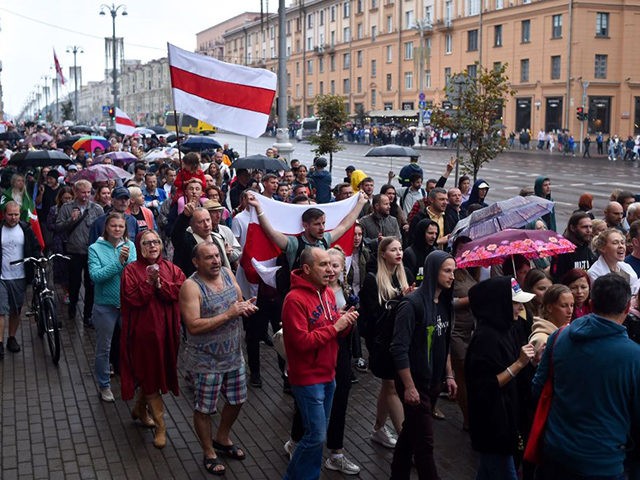Belarusian opposition leader Sviatlana Tsikhanouskaya sent a video message to the EU urging it to reject the “fraudulent elections” that kept Alexander Lukashenko in power.
Meanwhile, Moscow made threatening moves to warn the Europeans against “meddling” in the Belarusian crisis.
“I call on you not to recognize these fraudulent elections. Mr. Lukashenko has lost all the legitimacy in the eyes of our nation and the world,” Tsikhanouskaya told the EU’s emergency session on Belarus.
“I have initiated the national coordination council of Belarus. It will lead the process of a peaceful transition of power via dialogue. It will immediately call for new fair and democratic presidential elections with international supervision,” she said.
Lukashenko angrily denounced the 35-member opposition council on Tuesday as an “attempt to seize power” and warned the members would face “consequences,” ominously boasting that he has ways to “cool those hotheads.”
He further denied the oppositions’ allegations of massive vote-rigging, insisted he won re-election fairly, and ruled out holding new elections as Tsikhanouskaya recommended.
One of the many protest activities occurring across Belarus on Tuesday was a protest march to observe the birthday of Tsikhanouskaya’s husband Sergei, who was thrown in prison before the election was held on August 9, prompting his wife to step forward and take his place. Tsikhanouskaya’s message to the EU said her husband is imprisoned for “a crime he did not commit.”
“All of this blatant lawlessness and injustice shows how this rotting system works, in which one person controls everything, one person who has kept the country in fear for 26 years, one person who robbed Belarusians of their choice,” she said.
As the European Union debated sanctions against Belarusan officials for their roles in the election and suppressing the subsequent protests, Russian President Vladimir Putin warned France and Germany against “foreign interference” in the crisis during a telephone call.
Russian Foreign Minister Sergei Lavrov said there was no need for outside mediation in Belarus and accused the Europeans of taking unfair advantage of the crisis.
“We are concerned about the attempt to use the internal difficulties that are facing Belarus, the Belarusian people and the country’s leadership, to interfere in these affairs and processes from outside – not just to interfere, but to impose on Belarusians those rules that foreign players consider beneficial for themselves,” Lavrov said in an interview with Russian media.
Lavrov ranted at length about the Europeans supposedly stealing Ukraine from Russia’s orbit by supporting the 2014 Maidan protests, bizarrely claimed the Belarusan election is only disputed because European election monitors fell down on the job, insisted despite copious evidence to the contrary that Lukashenko and his government are eager to negotiate with the opposition, and took a swing at Baltic states like Lithuania and Estonia for seeking to undermine Lukashenko’s government.
Lithuania, which gave Tsihkahouskaya shelter when she said concerns for her safety forced her to flee Belarus after the election, drew Lavrov’s ire by praising the courage of the Belarusan demonstrators and urging the United States to get more deeply involved.
“They deserve a better life. They deserve a normal democratic environment,” Lithuanian Foreign minister Linas Linkevicius said in an interview with Fox News on Tuesday.
Linkevicius said Lukashenko should “understand that something is changing” because he is “met with anger, open anger” everywhere he goes. He warned that Russia may be contemplating an “invasion” of Belarus to prop up Lukashenko or replace him with another Belarusan leader agreeable to Moscow.
“Since it’s publicly discussed I cannot say it’s not possible, so we should take that into account at least, and also send a very clear message that it’s not tolerable to do that,” Linkevicius said of the Russian invasion threat.
The Lithuanian foreign minister hoped for “decisions, sanctions, pressure from the United States, which he said “was always a voice of democracy and freedom.”
Despite Moscow’s warnings, the European Union on Wednesday declared it does not recognize the results of the August 9 election in Belarus and confirmed it will “impose shortly sanctions on a substantial number of individuals responsible for violence, repression, and election fraud.”
“These elections were neither free nor fair and did not meet international standards. The protests in Belarus are not about geopolitics. This is in the first place a national crisis. This is about the right of the people to freely elect their leadership. We stand firmly behind the right of the Belarusian people to determine their own fate,” said European Council President Charles Michel after the emergency summit concluded.
“The people of Belarus want change and they want it now,” added EU Commission President Ursula von der Leyen. “We are impressed by the courage of the people of Belarus. For exactly 10 days since the presidential election took place, the people of Belarus have taken to the streets in unprecedented numbers.”
The Kremlin shot back that European interference in Belarus is “unacceptable.”
“We consider that Belarusians will iron out their own problems in the framework of dialogue, within the legal framework and without any foreign meddling,” said Kremlin spokesman Dmitry Peskov.

COMMENTS
Please let us know if you're having issues with commenting.